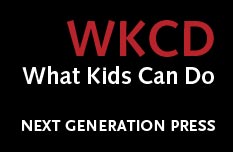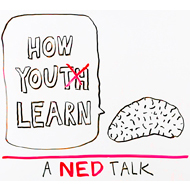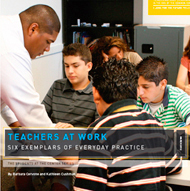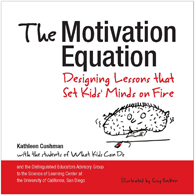

How Youth Learn: A Portfolio to Inform and Inspire Educators, Students, Parents & More
| Mindsets: Research Highlights | SHARE | |
| SEE ALSO: Conditions of Learning | Teenage Brain | Adolescent Development | Teenage Brain | Motivation & Mastery | Social & Emotional Learning |
Mindset, the influential book by Stanford University psychologist Carol Dweck, details the difference between a “fixed” and a “growth” mindset.
|
|
|
Those with a fixed mindset believe that people’s intelligence and abilities are static and outside their control. Through the 1960’s, this was the widely accepted theory of cognitive development. Those with a growth mindset, in contrast, believe that intelligence is dynamic and that the brain does change based on one’s experiences and efforts. With the accumulating evidence of the brain’s plasticity, the growth mindset is now the prevailing theory among cognitive scientists.
Regardless of the research, all of us develop a belief about our own intelligence, beginning in childhood. “Some students start thinking of their intelligence as something fixed, as carved in stone,” Carol Dweck explains. “They worry about, ‘Do I have enough? Don’t I have enough?’” She continues: “Other children think intelligence is something you can develop your whole life. You can learn. You can stretch. You can keep mastering new things.” (NPR, 2.15.07)
It turns out that these beliefs make a big difference in how children do in school. Students who see learning as a continuous process of improvement routinely outperform even students who consider themselves “gifted,” according to psychological studies. Cultivating that “growth mindset” helps them understand that intelligence is malleable, which leads them to take on challenges, persist through difficulties, and experience intellectual growth. In contrast, those with a “fixed mindset” tend to avoid tasks at which they might lose status by failing (Blackwell, Trzesniewski, & Dweck, 2007).
Students also hold other attitudes and beliefs regarding their own ability to succeed in school—beliefs that matter deeply.
Agency
Closely tied to growth mindset, “agency”—often referred to as “self-efficacy”—refers to the subjective judgments we make about our ability to organize and execute courses of action to attain designated goals (Bandura, 1977, 1997). Agency addresses the question “How well can I do something?” rather than “What am I like?” It is typically specific to the particular task and context (Zimmerman and Cleary, 2006).
The onset of adolescence marks a profound shift in expectations regarding agency. To succeed in school, adolescents need to develop diverse self-regulatory skills, such as goal-setting, self-monitoring, time management, and self-evaluation. They must learn strategies to enhance various forms of learning, such as note-taking, help-seeking, storing and recalling information, reading, writing, and test preparation (Zimmerman, Bonner, & Kovach, 1996). They must also learn how to manage out-of-school extracurricular activities, such as music or sports, and often part-time work and family responsibilities (Cleary & Zimmerman, 2001; McPherson & Zimmerman, 2002). The stakes for handling such matters rise dramatically during adolescence. In turn, youth at this age need more support—and opportunity—in order to develop a sturdy sense of their ability to strategize and take charge.
Belonging
Recent research also underscores the important role played by a student’s sense of school “connectedness” or belonging. We all hope that as students participate in academic and non-academic activities at school they develop a sense of belonging. For some, this grows as they make good relationships with peers and teachers or as they increasingly value and identify with the outcomes of schooling. But research suggests that many students do not see their school experience as having much to do with their future, or do not feel accepted by classmates or teachers. Such disaffection may make them disruptive or apathetic in class—if they come to school at all (e.g., Anderman, 2004).
Another important factor in adolescence is the sense of belonging in a social group for whom academic work holds value. As students decide “who to be” in school, their existing social identifications shape their beliefs and actions in one direction or another. If they believe that “people like them” (e.g., with respect to gender, race, ethnicity, or language) cannot attain the norms and standards of a particular group, they will act according to that belief. Considerable research on such “stereotype threat” has shown how this affects the self-perceptions, attitudes towards learning, and academic performance attitudes of students (Steele, 1997; Walton & Spencer, 2009).
Academic mindsets
Predictably, the performance of students is affected by the extent to which they believe that intelligence is malleable, their sense of self-efficacy, their sense of belonging in an academic context, and the value they place on schoolwork. If positive, such “academic mindsets” influence behaviors like conscientiousness and persistence, which lead to high academic performance. If negative, they lead students to doubt their own “smartness,” undermining their self-discipline and creating a self-defeating cycle of low performance. A large body of empirical research has shown that these attitudes and beliefs are more strongly associated with school performance than are test scores (Farrington et al., 2012).
Once classroom teachers understand the effects of academic mindsets, they can influence them with interventions that directly target students’ academic behaviors, perseverance, mindsets, learning strategies, or social skills. “The evidence suggests that finding ways to support positive academic mindsets can help students persevere in a given context, and that helping students build effective learning strategies is likely to lead students to more easily handle and hence complete difficult tasks,” Camille Farrington and her colleagues conclude (2012). However, they note a gap between research and teacher practice in terms of specific interventions to promote positive student mindsets.
Classroom culture
Classroom culture has also been shown to play a crucial part in the work of building academic mindsets. From a teacher’s behaviors and tone students pick up continual messages—whether explicit or implicit, intended or unintended. Based on that, learners come to conclusions about their own value and the value of their education. Do they belong in this classroom or are they outsiders with nothing to contribute? Can they succeed at this work or is it not even worth the effort? How will it matter, if at all? (Eccles et al., 1983)
A wide body of research has established the classroom conditions that affect the answers to those questions. They include:
- The level of academic challenge and teacher expectations for success
- Student choice and autonomy in academic work
- Clarity and relevance of learning goals
- The availability of supports for learning
- Grading structures and policies
- The nature of the academic tasks students are asked to do
- The type, usefulness, and frequency of feedback on student work
- Classroom norms of behavior and level of trust and safety (Farrington et al., 2012)
With all such matters related to mindset, students are at particular risk as they transition between one academic context and another (e.g., entering middle school, high school, and college) and must adapt to new academic and social norms (Hagborg, 1992; Harter, Whitesell, & Kowalski, 1992; Neild & Weiss, 1999; Simmons & Blyth, 1987). The extent to which teachers can support them during such transitions may make a critical difference to their futures.




